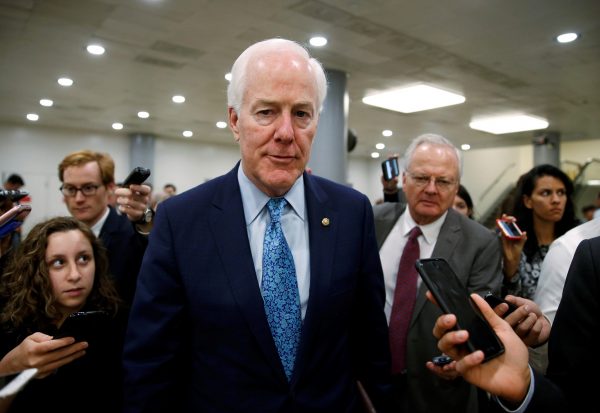However well-intentioned, the legislation as currently drafted would expand government bureaucracy, hamper the global competitiveness of US corporations and subject the process to unwarranted political considerations.
The major problem with the Cornyn approach lies in its proposal to restrict outward investment and technology transactions by US firms. The vehicle for the legislative approach is to revamp the mandate of the Committee on Foreign Investment in the United States (CFIUS), which was created in 1975 to screen foreign takeovers of US firms for any threat to US national security. The focus was on inward investment and technology acquisition. Under the Cornyn proposal, the CFIUS mandate would be expanded to cover US outward investment and accompanying technology in other countries.
Granting CFIUS this new and broader mandate raises three inter-related concerns. First, it could replace multilateral cooperation with unilateral restrictions on outward flows of ‘critical technology’ to neutral or adversarial nations. Second, it would thereby put US-based multinational corporations at a disadvantage relative to multinational corporations based in Europe or Japan when firms compete in third-country markets. And third, it would unnecessarily duplicate controls on the export of merchandise and technology established under the Export Administration Act.
The Cornyn legislation, known as the Foreign Investment Risk Review Modernization Act of 2017 or HR 4311, has garnered support from an array of Democrats. But it is far from clear that this legislation is necessary to achieve the stated goals. Using existing statutory authorities, President Trump could achieve the objectives sought by this Act.
If the CFIUS mandate is expanded, the CFIUS caseload would burst from 200 cases to thousands each year. Necessarily, the bureaucracy would blossom with new administrative and technical capabilities. Once the bureaucracy is created and reviews become a thrice-daily event, it will be almost impossible to turn the clock back to today’s open regime for investment and technology flows.
Chinese technology practices have generated the core motivation for HR 4311, and some concerns thereabout may be legitimate. China has targeted several high-tech industries for massive upgrading in the next 10 years. To help accomplish this goal, China compels foreign firms to transfer technology to Chinese business partners as the ‘price of admission’ to the vast Chinese market.
But President Trump has already directed the US Trade Representative to launch an investigation of China’s technology transfer practices. Once the investigation is concluded, measures to block US firms from acquiescing to Chinese demands could be Trump’s response whether or not the Cornyn bill passes Congress.
CFIUS has historically been charged with reviewing foreign merger and acquisition bids to acquire US companies. Reviews are ‘voluntary’ but an acquisition that has not been reviewed and approved can be subsequently revoked by the Justice Department, so in effect every significant case is subject to CFIUS review. Reviews are held in secret and are essentially immune from judicial challenge. The president can block an acquisition — but this has happened only four times in the history of CFIUS. More frequently, CFIUS recommends ‘mitigation measures’ that, if not accepted, could lead to withdrawal of the application.
The central question in a CFIUS review is whether the acquisition of a US company by a foreign player threatens national security. The Cornyn bill preserves the national security test but significantly enlarges the perceived sources of national security threat.
Cornyn implicitly designates China, Russia and other US adversaries as ‘countries of special concern’ without naming them. CFIUS is directed to scrutinise inbound and outbound investment and technology transactions with these countries. At the same time, Cornyn would allow CFIUS to exempt from review ‘covered transactions’ with foreign firms based in countries that have close security relations.
HR 4311 expands the scope of CFIUS review to cover foreign real estate acquisitions near US military bases or national security facilities and foreign minority positions in sensitive US firms.
HR 4311 should be narrowed to cover the immediate problem — forced transfer of critical technology to adversarial countries — without a massive expansion of the CFIUS mandate to review the bulk of outward foreign direct investment by US firms.
Narrowing the mandate could be accomplished with two provisions. First, the legislation should require the Committee to identify ‘critical technologies’, drawing on the resources of the intelligence community, the National Academy of Sciences and the National Academy of Engineering. Second, it could require the Committee to name ‘countries of special concern’. With these two provisions, US firms that develop critical technologies could be put on notice to seek CFIUS review prior to transferring the know-how to worrisome countries.
CFIUS review of questionable transactions should take into consideration the availability of equivalent critical technology from firms not based in the United States. Obviously, if an end run through Europe or Japan has already occurred, there is less reason to block the US firm. If an end run is a future possibility, then a decision to block the US firms should be accompanied by a forceful diplomatic demarche to US friends and allies to establish a multilateral basis for the denial.
Gary Clyde Hufbauer is a senior fellow at the Peterson Institute for International Economics (PIIE).
This article is based on a previous post published here by the Trade and Investment Policy Watch blog of PIIE.

